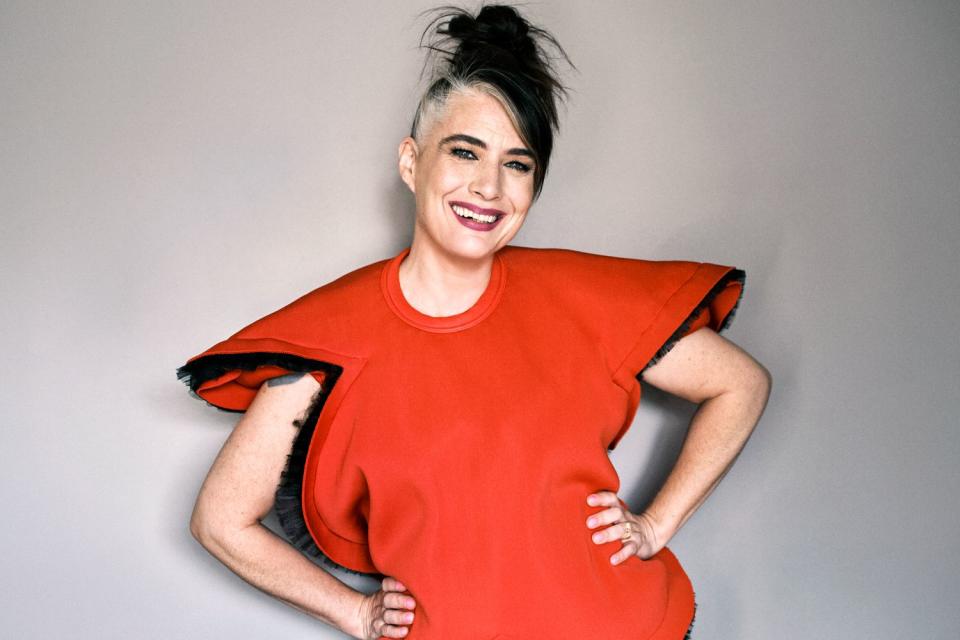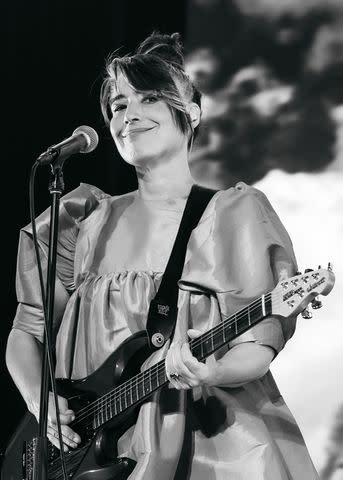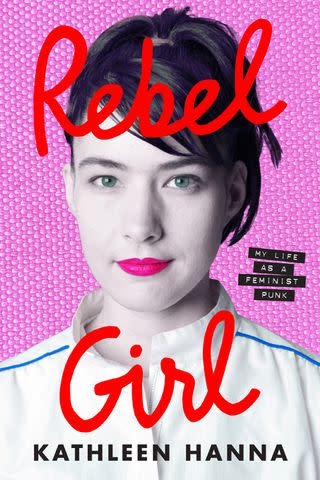Kathleen Hanna on Her Advice for Voters and How She Helped Name Nirvana's Hit 'Smells Like Teen Spirit' (Exclusive)
In an exclusive interview with PEOPLE, the Bikini Kill bandleader opened up about her new memoir 'Rebel Girl'

Jason Frank Rothenberg
Kathleen HannaBikini Kill's Kathleen Hanna new memoir Rebel Girl is out Tuesday
In it, the musician details her tumultuous childhood, her struggles with undiagnosed Lyme disease and her marriage
Hanna spoke with PEOPLE ahead of the book's release
Over the last three decades, there's not much that Kathleen Hanna hasn't done. As a punk pioneer, an activist, an artist and the face of the '90s "riot grrrl" movement, she has continually challenged sexist stereotypes and fervently advocated for the LGBTQ+ community.
While Hanna's career really launched with the feminist punk outfit Bikini Kill, alongside Tobi Vail, Billy Karren and Kathi Wilcox, however, she's also become revered for her work in the electro-punk band Le Tigre with Sadie Benning — and later JD Samson — and Johanna Fateman, as well as with The Julie Ruin with Wilcox, Kenny Mellman, Carmine Covelli and Sara Landeau.
For the first time, Hanna is telling her story with her memoir Rebel Girl: My Life as a Feminist Punk, which details her tumultuous childhood, her struggles with undiagnosed Lyme disease, her marriage to Adam "Ad-Rock" Horowitz of the Beastie Boys" and her friendship with Nirvana's Kurt Cobain. While there are many harrowing experiences in the book, she didn't want it to be a project that was "glorifying trauma."
"I picked the traumas that propelled the story forward and the ones that were particularly damaging and that I learned a lot from," the "Just My Kind" singer, now 55, says.
In an interview with PEOPLE, Hanna opened up about protecting her privacy as an artist, how she helped coin the name of the Nirvana hit "Smells Like Teen Spirit" and her advice to voters in the 2024 election.
Why did you decide to write a memoir at this point in your life?
I felt like I was walking into every single room with this slug trail of garbage behind me. I needed to just get rid of it, so I could start skipping into the future instead of trotting into it. By going back on tour with Bikini Kill and Le Tigre, I definitely saw this change in me because I was writing the book at the same time. I felt so much more gratitude the second time around with those bands, and I wanted to extend that same vibe into the rest of my life.
While onstage and in performance I started being more grateful and excited, [but] when I came home I really didn't know what to do with myself. I didn't understand why I was avoiding relaxing — or spending fun time with my son could be really hard for me, because typically when I've had really close connections, they haven't ended well. I think I was scared to open my heart up as much as I could. By dealing with all this stuff in the book and going through the trauma and the joy, I saw how much beautiful stuff had been in my life that the trauma had been keeping me from exploring.
At the start of the book, you say you wanted to leave a lot of the trauma "on the cutting room floor." What prompted you to make that decision?
I think, because, I didn't want it to be a book glorifying trauma. It's already a very heavy book, and there is a lot of trauma in it. It's important to admit most of us have multiple traumas. It's not just like this one terrible thing happened to us, and here's a book about me writing about it. You can get in a cycle where you learn that being in a toxic situation and constantly being in crisis is not your happy place but it feels familiar, and then you keep ending up in these very toxic, horrible situations. I didn't deserve that, I didn't ask for it, but I didn't know how to seek out healthy friendships.
I definitely didn't know that when I got onstage, I was going to suffer the same abuse that I had my whole life from just random boys and men in my regular civilian life. We all have a lot of trauma, so I wanted to leave a lot in to show that, but it's not just one thing. A lot of us are raped multiple times, and it feels like, ‘Oh, that's too much. You can't say that much.’ But I also wanted to acknowledge, I had even more trauma than was in that book, that I cut out because this is all that this one project could hold. So I picked the best traumas. No. I picked the traumas that propelled the story forward and the ones that were particularly damaging and that I learned a lot from.

Rachel Bright
Kathleen HannaOn that note, there were a lot of harrowing moments in the book including what seemed like a pure, innocent friendship with a man named Darren, which later in the book ended with a gut punch that he raped you. The way you wrote it hit really hard.
I wanted it to hit you really hard. I was just as shocked as you were — if not more. And that feeling of complete and utter confusion, that something like that could happen at the hands of this person who had meant so much to me, I still have a hard time believing it really happened. And it did, and he's acknowledged that. But I think it's really similar to a lot of things that happen in people's everyday lives, where you think you're having a normal conversation, then it turns into micro-aggression fast. In the moment, you don't even know what to do. You feel so many different emotions.
In that situation, with that sexual assault, it really was like I was in a horror movie. I wanted to have the reader not experience what I experienced, but even when I would go back through edits and I would read it, I knew what was coming and I was still shocked when I read it. I kept in that we took baths together. We were wearing towels. A lot of people don't tell their stories because they're not the perfect victims. I wasn't wearing a pair of sensible slacks and a buttoned-up shirt, flat shoes and walking on the street in broad daylight and someone grabbed me. I was wearing a towel next to a man in a bed. Does that make me a victim or a survivor? Or does that make me culpable in the crime that was committed against me? That's part of the question and part of the reason why I didn't talk about it for so long.
Your experience growing up with your dad was quite traumatic, between his alcoholism, his wielding a gun around and some moments that appear to be somewhat incestual, which you realize once you're working at Safe Place. Still, you would continue to return to your dad's place over the years. Why?
First of all, I should clarify, I'm not a victim of incest. I grew up in a household that had kind of an incest-y vibe of my dad checking out my sister's body and him being sexually inappropriate with the both of us. But I was not raised by my father, and I think it's really important I say that. To be perfectly honest, the reason that I maintained a relationship with my father was money. He had more money than my mom. He didn't pay child support for many years, and I was trying to convince him to pay back child support.
A lot of times I would see him because I thought I would get something financially out of it. I would be in situations where my heat was going to get turned off, and I needed a couple of hundred bucks to get it turned on. So I would spend a weekend with my dad, and at the end, I would ask him for $200. Part of that is what led me to stripping because I was like, I'm really just doing psychological stripping for my dad to get $200, and it's taking me a whole weekend. I can make $200 in an hour actually taking my clothes off. It was way less emotionally fraught to take my f---ing clothes off and get that kind of money, than it was to have to spend time with someone who did not care about me at all and made me feel dehumanized.
He could also be a wonderful, kind person in moments, and that's true, too.
Throughout the book, there are some really interesting anecdotes about your friendship with Kurt Cobain of Nirvana. It also turns out that you were accidentally responsible for naming their 1991 hit "Smells Like Teen Spirit" when you were drunk with him. Can you tell me about that?
It was just a weird thing. I called the chapter, “Benjamin Franklin's Glasses” because my whole joke to my friends about it was, "I'm the girl who found Benjamin Franklin's glasses in the trash, and I'll always be known for that.” It felt like this odd thing that had nothing to do with me. I wrote a lot of things on Kurt's wall that night. I was really drunk. I wrote it in Sharpie.
When I wrote “Kurt smells like teen spirit,” I do want to always say, it had nothing to do with my family, Tobi Vail, who he was dating at the time. Because it's been inferred over and over that Tobi used that deodorant, and I was in some way referring to her smell being on him, which we know is a thinly veiled, sexist thing. That's not at all what happened. Tobi and I were laughing at the store earlier in the day when we saw this deodorant. It was called “Smells Like Teen Spirit,” and it was so weird, like “I Can't Believe It's Not Butter;” it was one of those long-ass titles that was so bizarre.
So, it was in my head when we were drinking that night, and I wrote this stuff on his wall, and then he asked me later, "Can I use that in a song?" I was like, "Yeah, sure. No problem." That was really it. It's really weird to offhandedly do something and then to later be driving on the freeway and see it on a huge billboard. It's nothing earth-shattering, it's just weird. It's like people who go viral for something.
There are also some revelations in Rebel Girl about parts of your life you've notoriously kept private, like your marriage to Beastie Boys' Adam Horowitz and adopting your son, Julius. Was it a conscious decision to keep that part of your life to yourself?
It was a conscious decision. As a feminist artist, I don't want to invite work-balance questions for the rest of my life. I'm fine talking about it now, especially because I've introduced these topics. But I didn't want to talk about motherhood in interviews all the time, and I didn't want to talk about my relationship. Again, the same thing with Kurt. It's like, I don't want to be the footnote in King Ad-Rock's story or Kurt Cobain's story. I'm a feminist artist with my own trajectory and my own musical legacy, and I want to be seen as that. But Adam's really important in my life, and I wasn't going to pretend like that wasn't true because I was just going to keep avoiding dealing with other people's stupid stereotypes. I can't try to be the opposite of the stereotype all the time because it makes me boring and stale and not three-dimensional.
In terms of Julius, my son, he would have been so mad at me if he wasn't in the book and was like, "You better put me in your book, Mom." So I put him in the book because he wanted to be. But we're not a Hollywood family. I mean, nothing wrong with being celebrities or whatever, [but] we don't live our lives in a celebrity way. I don't want to put my son on Instagram as a feminist artist who speaks out about all kinds of issues, whether it be the genocide in Gaza or whether it be sexual harassment or abortion. I don't want to bring anything dangerous onto my son because there are still stalkers and haters out there. It's important to protect him, and he also shouldn't have to live in his dad or my shadows.

Ecco
'Rebel Girl' book coverHow did art and music help you cope with the more traumatic aspects of your early childhood and your teen years?
Whenever I was in a space where I was creating something or working on a poem in my journal and being really excited to come home from school to work on it harder, it always gave me this place where I felt like I was safe and nothing bad could happen to me while I was creating. I moved a lot as a kid and I didn't have a lot of feeling of security. So my records were my friends. I looked forward to when times were bad. I knew I could always return to my Jackson 5 record or my Tony DeFranco record and sing along and feel good.
You've always been a fervent supporter of women's rights, LGBTQ+ community, etc. As we're in an election year, what's your advice for voters?
I think until there's a ceasefire in place, I'm going to stay uncommitted. And what I'm going to do on voting day, and what I will say out loud as we get towards that to keep Trump out of office, is a different story. But for right now I need to express my great dissatisfaction with the Biden administration using my tax dollars to murder people. It's absolutely atrocious. I'm horribly disgusted. It's difficult for me to be picking out pants for a f---ing book tour, when I know that all of these people are being rounded up and f---ing murdered.
I think it's incredibly important that Trump does not become the president again, but I'm greatly dissatisfied with the Biden administration and with the way they've dealt with not protecting the safety of protesters.
After your book comes out, what's next for you?
I am making music with two of my friends, and I'm hoping to write an album in the fall. I'm also making a documentary about Darcelle XV, who was my beloved uncle and the oldest living drag queen in the world, who passed away sadly a year and a half ago. I believe his club Darcelle XV is still running so it is the longest-running drag bar, at least in the United States. Once I have some time to wade through it and start with the editing process, I'm really excited to make this documentary. And I want to get a job in writing comedy for TV. That's just something I've wanted to do for a long time. I love music, and it's such a huge part of my life but when I want to go out to a show these days, I really want to see live comedy. I feel like it's the punkest art form right now for me. It's inspired me to start coming up with ideas for shows and movies. My husband and I sold a show many, many years ago to Comedy Central that didn't end up getting made.
I'd like to get back into that work because I find it satisfying. I really want to be in a writers' room and collaborate with other people because I love the collaboration process. I can't stay on tour forever, I need to find something that allows me to be home more.
Rebel Girl is out on May 14 via Harper Collins.
For more People news, make sure to sign up for our newsletter!
Read the original article on People.
